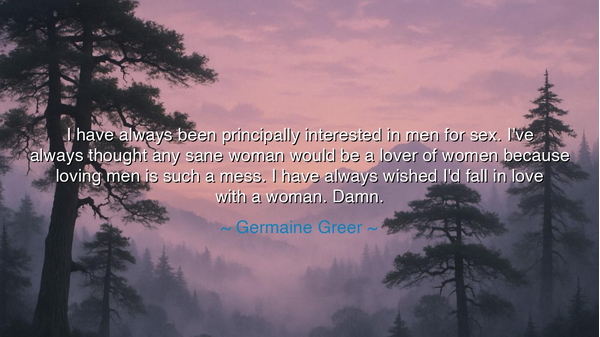
I have always been principally interested in men for sex. I've
I have always been principally interested in men for sex. I've always thought any sane woman would be a lover of women because loving men is such a mess. I have always wished I'd fall in love with a woman. Damn.






The words of Germaine Greer — “I have always been principally interested in men for sex. I’ve always thought any sane woman would be a lover of women because loving men is such a mess. I have always wished I’d fall in love with a woman. Damn.” — ring with raw honesty, born from a life spent challenging the boundaries of culture, gender, and desire. In them, she lays bare the tension between passion and frustration, between longing and disappointment. She speaks as one who has seen the flaws of men and the sorrows that follow women who tie their hearts to them, yet who still acknowledges the pull of physical desire.
At its heart, this saying reveals the paradox of love and sex. Greer, fierce critic of patriarchal systems, admits that her attraction bound her to the very men she so often denounced as flawed partners. She wonders aloud if the wiser path would be to seek intimacy with women, who, in her eyes, might offer tenderness unmarred by the burdens and failings of male dominance. Her lament — “Damn” — is not only about desire, but about fate: the cruel irony of wishing for a different heart than the one she was given.
Such confessions echo across history. Consider the poet Sappho of Lesbos, who centuries before dared to sing of her love for women, elevating their beauty and affection into immortal verse. In her voice, love became pure flame, untouched by the struggles Greer names with men. Yet Sappho, too, lived in a world shaped by male power, her words surviving only in fragments, showing that even women who loved women faced the weight of societal judgment.
Greer’s words also speak to the universal truth that love is not always rational, nor aligned with what seems wisest. Many have loved against their own judgment, pursued desire though it led to sorrow, or longed for different affections than their hearts allowed. Love is a force both liberating and enslaving, a fire that refuses to be mastered by reason. To acknowledge this — as Greer does — is to embrace the bittersweet truth of human passion.
Let future generations learn from this: sex and love are not the same, and the heart does not always follow the path of wisdom. Desire may bind us to hardship, and love may grow where we least expect. Yet even in the struggle between what we wish and what we feel lies the essence of our humanity. Greer’s lament is not despair but a testament: that to live fully is to wrestle with longing, to confess truth without shame, and to honor the wildness of the heart.






AAdministratorAdministrator
Welcome, honored guests. Please leave a comment, we will respond soon